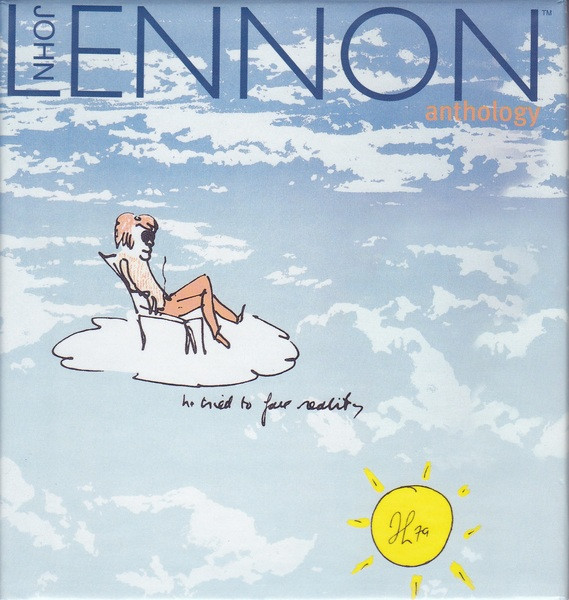 After years of backpedaling and increasing bootlegs, the success of the Beatles Anthology convinced all parties involved that a similar box devoted to John would be a lucrative exercise. For the most part, the John Lennon Anthology is chronological, with the occasional inexplicable detour, neatly divided into four sections: “Ascot” covers Plastic Ono Band and Imagine, “New York City” takes us up until “The Lost Weekend”, with “Dakota” covering what would be the end.
After years of backpedaling and increasing bootlegs, the success of the Beatles Anthology convinced all parties involved that a similar box devoted to John would be a lucrative exercise. For the most part, the John Lennon Anthology is chronological, with the occasional inexplicable detour, neatly divided into four sections: “Ascot” covers Plastic Ono Band and Imagine, “New York City” takes us up until “The Lost Weekend”, with “Dakota” covering what would be the end. As often happens, many of the tracks aren’t that different from the released versions. Case in point: the very first song, a redundant alternate of “Working Class Hero”. But every now and then a track surfaces that’s illuminating. An earlier take of “Isolation” shows how they came up with the best way to nail the middle section. There’s a hilarious run-though of “Remember” that shows him in a light-hearted mood. “God Save Us” and “Do The Oz” are included for completists’ sake, and the latter sounds a lot less hideous on the 2000 Plastic Ono Band reissue.
The second disc nicely includes some songs from various contemporary benefit concerts, as well as the better “stop the war” take of “Come Together” from the One-to-One shows. Two uncompleted home tapes from 1970 show how “Mind Games” was assembled, and we even get John’s guide vocals on a few Ringo tracks. “One Day (At A Time)” is included in an earlier, far superior take with the vocal in a lower register, giving it a much more relaxed and much less panicky approach that would have been improved Mind Games greatly. “Real Love” is on this disc for some reason, and we notice that “Free As A Bird” isn’t included at all.
The third disc expands on the material that went into Menlove Ave., reaching its apex with “Be My Baby” (finally!) and exposing the nadir in several shouting matches with Spector. “Stranger’s Room” is an early blueprint for “I’m Losing You”, and an effective transition to the final disc, which rises to the challenge of actually adding something to the hours upon hours of tapes already out there. High points include the Cheap Trick version of “I’m Losing You”, some dialogue with Sean and an edited “Dear John” which may have been his last recording. “Grow Old With Me” features a George Martin orchestration, recorded after the Threetles had passed on it their own Anthology. The “Something More” section of the fourth disc covers some of the skits and satires he tried while on hiatus, ending with a wistful “It’s Real” snippet. It inspires a sigh when it ends, a sad reminder that the buried treasure will always be finite.
The packaging is certainly pretty, in a soothing light blue sky with clouds motif. The liner notes leave something to be desired, though Yoko’s essays on each period are pretty poignant and, combined with the man’s voice, one is reminded only too clearly that the world just hasn’t been the same since that December night.
As with most archival releases by anyone, Anthology is hardly the place to start if you don’t have anything and everything else. Luckily for the rest of us, not all of the tracks are straight repeats from the Lost Lennon Tapes series, so this is certainly a nice addendum to the bootlegs. (Wonsaponatime was a concurrently released single-disc distillation of the box, and is truly for collectors only.)
There are, again, hours upon hours of other pieces that could have gone on here, but Yoko always has the last word as to what goes into the official documents. Also, with the emphasis on music and enlightening the uninitiated, she didn’t bother with more studio patter and background that would be more insightful to us students. After all, she’s trying to run a business here.
John Lennon Anthology (1998)—3½
No comments:
Post a Comment